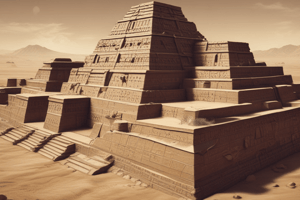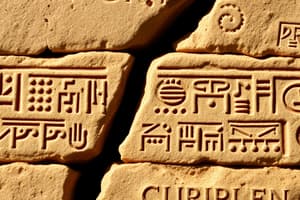Podcast
Questions and Answers
What civilization dominated Mesopotamia and is credited with inventing cuneiform writing?
What civilization dominated Mesopotamia and is credited with inventing cuneiform writing?
- Mayans
- Greeks
- Egyptians
- Sumerians (correct)
Which Latin-derived term describes the wedge-shaped indentations made in clay tablets in cuneiform writing?
Which Latin-derived term describes the wedge-shaped indentations made in clay tablets in cuneiform writing?
- Glyph
- Calligraphy
- Cuneiform (correct)
- Rectilinear
What was the primary purpose of cuneiform writing for the Sumerians?
What was the primary purpose of cuneiform writing for the Sumerians?
- Artistic expression
- Building construction plans
- Preserving medical records
- Recording transactions and religious rituals (correct)
Which civilization adopted cuneiform writing after it was invented by the Sumerians?
Which civilization adopted cuneiform writing after it was invented by the Sumerians?
How did the surplus of grain produced by the Sumerians contribute to their societal development?
How did the surplus of grain produced by the Sumerians contribute to their societal development?
What material did the Sumerians typically use for writing when utilizing cuneiform?
What material did the Sumerians typically use for writing when utilizing cuneiform?
What was one of the main purposes of cuneiform writing?
What was one of the main purposes of cuneiform writing?
Which civilization used cuneiform writing?
Which civilization used cuneiform writing?
What did cuneiform evolve to include that allowed it to represent sounds and spoken language?
What did cuneiform evolve to include that allowed it to represent sounds and spoken language?
Which famous literary work was written in cuneiform?
Which famous literary work was written in cuneiform?
What happened to cuneiform after the first century AD?
What happened to cuneiform after the first century AD?
Where is the Cuneiform Collection housed that contains tablets dating back to the reign of Gudea of Lagash?
Where is the Cuneiform Collection housed that contains tablets dating back to the reign of Gudea of Lagash?
Flashcards are hidden until you start studying
Study Notes
Mesopotamia Civilization: Sumerians and Cuneiform Writing
Mesopotamia, located in present-day southern Iraq, was the site of one of the world's earliest civilizations, dating back to around 4000 BCE. This civilization was dominated by the Sumerians, who are credited with inventing the writing system known as cuneiform.
Sumerians
The Sumerians were a people who thrived during the third millennium BCE. They were known for their skill in agriculture, which enabled them to develop a centralized economy based on the surplus of grain produced. This surplus allowed them to build cities, such as Uruk, where they established institutions, including temple complexes, which were central to their society.
The Sumerians were the first to develop writing in Mesopotamia, which served a variety of purposes, including recording transactions, religious rituals, and literary works. Their writing system, cuneiform, was used by scribes for over three millennia and provided a window into ancient Mesopotamian life.
Cuneiform Writing
Cuneiform writing is a form of writing that uses a reed stylus to make wedge-shaped indentations in clay tablets. The word "cuneiform" is derived from Latin, with "cuneus" meaning "wedge" and "forma" meaning "shape". The system was invented by the Sumerians and later adopted by other civilizations in the region, including the Akkadians, Assyrians, and Babylonians.
In its early stages, cuneiform was a logographic writing system, with symbols representing pictures of objects or concepts. Later, it evolved to include phonetic symbols, allowing it to represent sounds and spoken language as well. The system was used to write a variety of languages, including Sumerian, Akkadian, and Elamite.
Cuneiform was used for many purposes, including recording transactions, religious texts, and historical accounts. Some of the most famous examples of cuneiform writing include the Epic of Gilgamesh, one of the world's oldest works of literature, and the accounts of Assyrian kings like Ashurbanipal, who amassed a vast library of cuneiform texts.
After the first century AD, cuneiform was largely replaced by alphabetic scripts. Despite this, the study of cuneiform remains an important field of research, providing valuable insights into the history, culture, and language of ancient Mesopotamia.
The Cuneiform Collection at the Library of Congress
The Library of Congress has a collection of over 38 cuneiform tablets, cones, and brick fragments, dating from the reign of Gudea of Lagash to Shalmanassar III. These items include school tablets, accounting records, and commemorative inscriptions, providing a rich source of information about Sumerian and Mesopotamian culture and history.
Studying That Suits You
Use AI to generate personalized quizzes and flashcards to suit your learning preferences.




